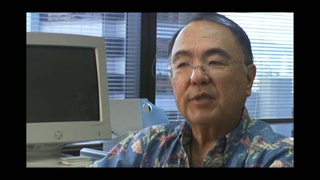Interviews
Image of Americans
Their image of an American was Caucasian or non-Asian. So to meet an Asian American, especially a Japanese American, for them was…where do you categorize? How do you fit this person in into their idea? So I probably have changed that idea for a lot of people who have met me. But it also made me aware of being both – that I’m neither one nor the other. I am both. And so for many Japanese, they go, “Oh, does that mean your mother is American?” I said, “No, my father is American, too.” That kind of throws them. “But you have a Japanese name.” I said, “Yes, because my father and my mother are ethnically Japanese, but their nationality is American. They were born and raised in America.” So that sort of opens a lot of conversation. It has also made me aware of, in some ways, how Western I am, as opposed to Japanese. But, at the same time, I guess growing up in Hawaii, being both was not unusual. You study Japanese, you practice certain Japanese customs – that was not unusual. But for a Japanese here, it’s unusual. It’s like, “How do you do both?” And it’s not doing both, it just naturally occurs. So at one time, it’s like the students or even the teachers would say, “So, which side of your family…does that make you half?” I said, “No, it doesn’t make me half. I’m 100 percent American because that’s my nationality. But I’m also 100 percent Japanese because all my grandparents originally came from Japan. So I’m not half as much as I’m maybe 200 percent.” And so for them, it’s like a whole different concept.
Date: November 8, 2003
Location: Tokushima, Japan
Interviewer: Art Nomura
Contributed by: Art Nomura, Finding Home.
Explore More Videos

Tracing my family crest
(b. 1967) Hawai`i-born professional fighter in Japan

Ring name: "Yamato Damashi"
(b. 1967) Hawai`i-born professional fighter in Japan


Citizenship and identity
(b. 1967) Hawai`i-born professional fighter in Japan


Importance of self-representation in legislation
(1927-2010) Political Activist



Defining the term Nikkei
(1923-2011) Lawyer, MIS veteran, founder of Francis and Sarah Sogi Foundation




Japanese Americans are more aware of their Hapa identity
(b. 1965) filmmaker and artist


Less information about Hawai‘i in mainland
(b.1944) Founder of Kobayashi Group, LLC
